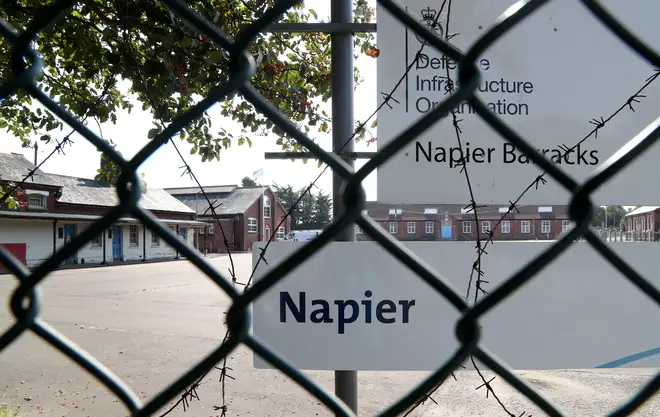
Nick Abbot 10pm - 1am
16 February 2021, 19:16

Asylum seekers housed at a former army barracks are left "powerless to protect themselves" because the Home Office has "failed to prevent the spread of Covid-19", the High Court has heard.
The Napier Barracks in Kent has been used to accommodate hundreds of asylum seekers since last September, despite the Home Office being previously warned by Public Health England that it was unsuitable.
In January, more than 100 people tested positive for coronavirus during an outbreak at the barracks, where conditions are said to pose "real and immediate risks to life and of ill-treatment".
Read more: 1.7m people added to Covid-19 shielding list as experts identify more risk factors
Just 63 people are still housed at the site and none are currently "under isolation", the court heard.
Six men who were previously housed at the site, all said to be "survivors of torture and/or human trafficking", argue the Government is unlawfully forcing people into buildings which are not "Covid-secure" as it is "impossible to socially distance".

Lawyers for the Home Office conceded at a hearing on Tuesday that most of the claims were "arguable" after documents which undermined its defence were discovered.
Barrister Lisa Giovannetti QC told the court that, after reviewing "a large volume of internal emails" and other documents, she was "not satisfied that the factual foundation is sufficiently solid or clear" for her to oppose permission for their legal challenge being granted.
The case that conditions at the barracks breached human rights and the Home Office breached its duty to provide adequate accommodation will be considered at a full hearing later this year.
Lawyers representing the asylum seekers earlier told the court that the Home Office "knew or ought to have known of the impossibility of effective means of controlling or containing infection at the barracks".
Read more: New Nigerian Covid variant detected in UK as 33 cases confirmed
Shu Shin Luh, representing two of the men, said in written submissions that there are "present and continuing" risks to those being housed at Napier Barracks because of the virus.
Ms Luh also argued that the barracks were particularly unsuitable for vulnerable individuals.
She said: "The barbed wires and fencing, and the regime of curfew and restrictions, served as recurring triggers for flashbacks to past torture and serious ill-treatment."
Tom Hickman QC, representing the other four claimants, said that Public Health England "warned the Home Office on September 7 2020" - before asylum seekers were moved into the barracks - that they were "not suitable for use" and said the "advice was rejected".
He added that there was "a mental health crisis" among those housed at the barracks, with conditions having "triggered or exacerbated" his clients' underlying mental illnesses.
He also said the Home Office had "no effective or adequate procedures" for identifying whether those housed at Napier Barracks were vulnerable and should not be accommodated there.
Sue Willman, a solicitor at Deighton Pierce Glynn which represents four of the claimants, said after the hearing: "The Home Secretary has today conceded that the arguments we made on behalf of asylum seekers held in Napier Barracks were arguable and that the case should go ahead to a full trial.
Read more: Thousands of Amazon staff wrongly told to self-isolate after false-positive Covid tests
"This is very welcome news. Our clients were subjected to demeaning conditions in Napier Barracks for over four months before the Home Office was ordered by the court to move them to alternative adequate accommodation."
She added: "Refugees arriving in the UK, often after experiencing torture and trafficking, have the right to be provided with basic humane accommodation.
"Disused military barracks at Napier and Penally (another former army barracks housing asylum seekers in Pembrokeshire, Wales) are far from that and now need to be closed."